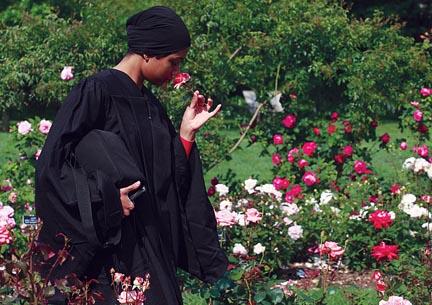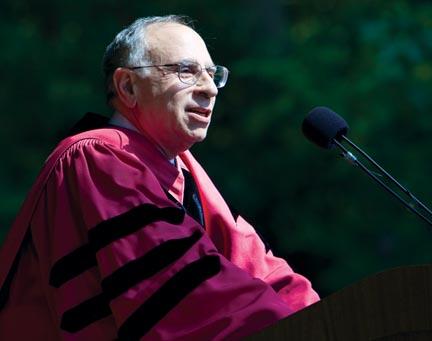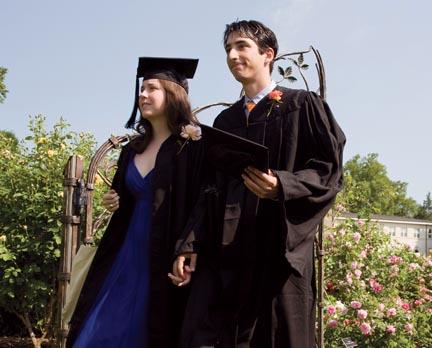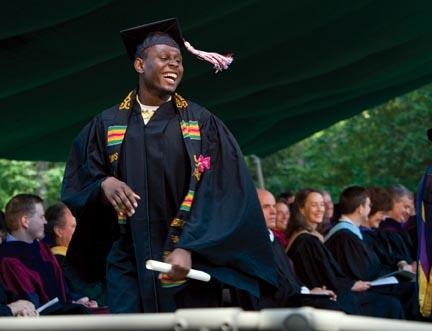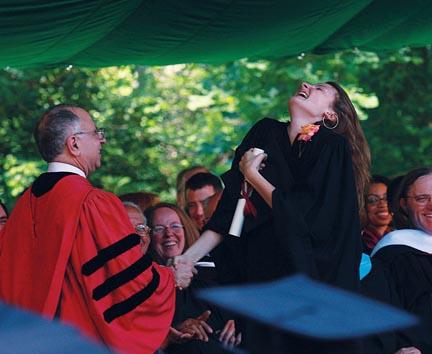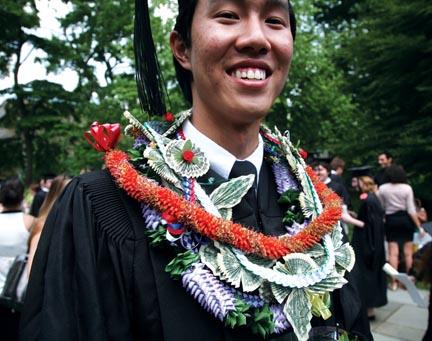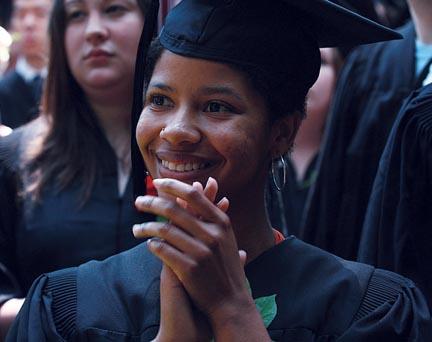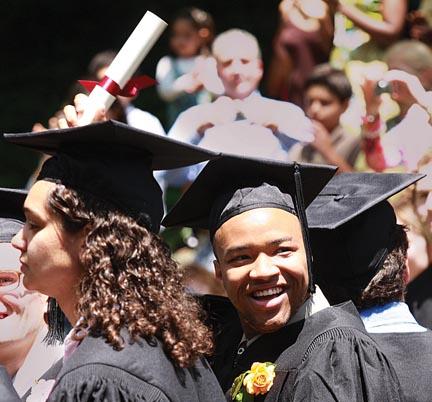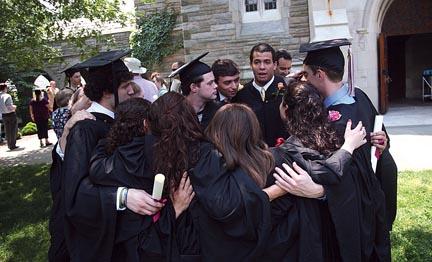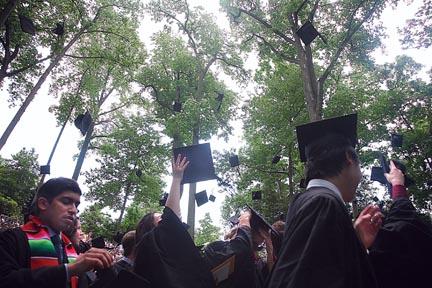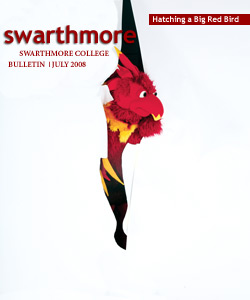Commencement Address 2008
Among the greatest privileges of being president of this remarkable institution has been coming to know its alumni, whose number you join today. Their passion for ideas and experience, their personal warmth, their astounding achievements, and their affection and admiration for Swarthmore are constant sources of joy, and of pride. As inspiring, and, perhaps, even more distinguishing, are the rigor of their intellect, the sensitivity and complexity of their ethical judgment, and the analysis, care, and resolve they invariably invest in seeking to advance the broader conditions of humanity.
Swarthmore graduates persist in imagining a world that will offer security, nutrition, health care, education, respect, personal freedoms, political participation, and opportunity to everyone. They persist in applying their exacting and creative habits of mind not only to their professional success, but also to better understand how that more ideal world can be built. They persist in judging leadership, policy, and action in light of the most comprehensive understanding they can assemble, and in terms of how that leadership, policy and action will not only affect their own communities and nations, but impede or hasten the realization of that better world. And across whatever careers they pursue, Swarthmore graduates persist in striving to align the manner and purposes of their own lives with contributing to the knowledge, the beauty, the health, the productivity, the justice, the inclusion, the environmental responsibility, and the resolution of conflict that will create that more humane world.
This might sound simply like the marketing strategy of a shrewd college president, or, maybe, the pure fantasy of an overly proud and optimistic one. But I assure you that the more I come to know the alumni of this College and to see what they have accomplished, and why; the more I listen to those who work with and for them, and to the many, very many, who have been inspired by them, the more consistent and powerful the support I find for the characterization I propose. And if each of you, graduating today, reflects on whether striving to align your own life with contribution to a more humane world has become inherent to who you are, I know you’ll uncover in yourself the evidence that clinches my claim.
I suggest that two core traditions of this College, and their reflections in current practice, are fundamentally responsible for generating this unmatched educational legacy: First, Honors. Launched by President Aydelotte and the Swarthmore faculty in the 1920s, it declared Swarthmore’s unabashed commitment to independent, rigorous, and creative thought. Over time that commitment, still epitomized in Honors, has come to define the nature, and expectation, of the College’s academic program as a whole. And second, the Quaker tradition, which established as an ethical cornerstone of this College’s institutional culture, the imperative to listen to others, and accord them respect and care. Over time that imperative has come to transcend boundaries of race, ethnicity, religion, class, sexual orientation, and national origin. And, over time, embrace of that imperative—to listen to others and accord them respect and care—has come to be regarded by this community as an essential ingredient of what it means to be educated.
Moreover, its embrace has moved this community to see the ultimate value of intellectual engagement, not in its contribution to creating knowledge per se, but in its contribution through the knowledge it creates to a fuller life for all.
Prospective students are increasingly attracted to Swarthmore by its linked commitments to analytic rigor, to ethical intelligence, and to advancing the broader conditions of humanity. And, even if students are not consciously drawn to the College by these interlocking responsibilities, once they arrive, they enter a culture steeped in them, engage them with resolve, not infrequently press the College to live them even more fully, and actively pass them on to the classes that follow.
National foundations and collegial institutions more than ever base their heightened esteem for Swarthmore in these distinguishing dimensions of our mission and practice. Donors, more than ever, find in them their inspiration to invest; and, I believe, it is in identifying with and building on these commitments where Swarthmore’s greatest potential for leadership lies.
The synergy they produce has shaped an extraordinary educational crucible, which today is graduating each of you, 364 future teachers and researchers; future lawyers, doctors, writers, artists, academic presidents, and philanthropists; future hedge fund managers, directors of NGOs, CEOs of multinational corporations, and political leaders of this and other nations—who will each thrive in the career you choose, and at the same time, through and beyond that career, bring your sharp analytic skills and keen ethical intelligence to shaping a more universally humane world.
Clearly, astute agents for the common good graduate from all institutions, and many have not enjoyed the benefit of higher education at all, but it is a great source of satisfaction for this College that it can consistently find its graduates, as it will find each of you, among the ranks of those astute agents for the common good.
Yet, for Swarthmore, is being consistent in producing such graduates enough? Or, does our consistent success not oblige and empower this College to attempt to generalize the educational impact it has?
Across the range of American higher education, as I see it, with rare exceptions, institutions have come to focus their mission and practice almost exclusively on preparing students to fit into, and thrive personally, in a postgraduation world. They offer little institutional encouragement to think critically and creatively about the priorities societies and the world should set. They pay scant deliberate attention to transforming students’ own social impulses into thoughtful evaluation of how leadership, policy, and action might affect those priorities. They offer little inspiration to complement professional accomplishment with concern for, and contribution to, the common good.
Yet the graduates of higher education will live in a world that confronts a rapidly degrading environment, increasingly severe competition for markets and natural resources, acute inequities in wealth and opportunity, and technologies of inconceivably destructive power. They will live in a world in which sustaining democracies, productivity, peace, and the planet itself hinge on citizenries and leadership ready to take into account the consequences of their decisions for all human beings and for the world they share.
Given the critical need for citizens and leaders with societal and global vision and the potential of higher education to produce them, shouldn’t we expect more from higher education than it generally delivers? Given the enormous financial resources devoted to higher education in the form of public funds, family expenses, and philanthropy and the enormous energies devoted to it by faculty, staff, and students themselves, shouldn’t we expect higher education to aim beyond developing the knowledge and skills that equip young men and women for graduate work and the careers they choose? In the value realm, shouldn’t higher education seek to foster more than academic honesty, personal integrity, and, in some measure, interpersonal respect? Shouldn’t a B.A. or B.S. degree come to promise, along with all the wonderful things it already implies, that the bearer is prepared, as a citizen and leader, to engage responsibility for a better society and world?
Higher education has begun in preliminary ways to act on this more demanding expectation. Community-based learning, for example, has arisen as a means to expose students to social conditions and perspectives they would otherwise be unlikely to encounter, while prompting them to envision a world in which everyone is a stakeholder. And Project Pericles, launched by Eugene
Lang—cherished mentor and benefactor of this institution—has galvanized 22 colleges and universities to place developing civic and social responsibility among the central components of their educational missions. These initiatives represent important first steps towards a redefinition of purpose and possibility.
Now I believe it is time to ask higher education to stretch its conception of what it can and must accomplish, to call on the full range of American institutions to produce graduates who are consistently prepared not only for careers, but for addressing, with analytic caution and optimistic resolve, the concerns of a larger world.
As responding to this educational mandate comes to be recognized as not only possible but urgent, faculty and leaders of student life will develop their own curricular and co-curricular structures that deliver more specifically on it. But the change will primarily be manifest in an expansion of the perceived purpose of learning and of education itself, rather than in any major shift in the content of what is taught. Academic disciplines will continue to play their core roles in intellectual formation and career preparation, but students will come more consciously and deliberately to draw on the knowledge and skills those disciplines offer, as Swarthmore students do, to also engage the responsibilities to the common good newly expected of them.
In the late 1980s the call to diversify faculty, students, staff, and curricula went out to an audience not yet comfortable with the idea. Yet as consciousness developed over the critical need for academic institutions to offer access to all segments of America’s population and to create educational contexts enriched by the talents and perspectives of our whole society, the case for diversity rapidly gained traction, and very considerable progress was achieved.
As this new mandate itself begins to gain traction, it will likewise raise concerns about possible effects on the quality of the intellectual and educational enterprise and likewise raise doubts over whether so radical an innovation can be accomplished. But the model Swarthmore provides is the response to these concerns. This college has demonstrated that placing intellectual life at the service of the common good, rather than compromising its quality, infuses that life with enhanced significance, and that placing higher education at the service of the common good only directs higher education more fully toward what our societies and world must expect from it.
I ask each of you, very-soon-to-be graduates of this educational treasure, to support its distinctive qualities and its continuing success in every way you can. Help Swarthmore to be an ever more persuasive model of the kind of undergraduate education a productive, humane, and stable world requires. And in living this College’s legacy, be unabashed in your own efforts to determine and act on the societal and global good. Visions rooted in them carry an educational force that can be as transformative for others as your Swarthmore education has been for you. Swarthmore takes great pride in you and looks forward with great anticipation to the combined impact the Class of 2008 will have on the broader conditions of humanity, both directly and through forging a more demanding expectation of the purposes and accomplishments of higher education.
Warmest congratulations to each, and to all, of you!
 Email This Page
Email This Page